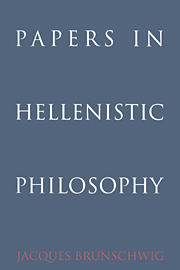2 - Epicurus and the problem of private language
Published online by Cambridge University Press: 25 October 2009
Summary
Many modern scholars have considered that, of all the ancient philosophers' many theories on the origin and nature of language, the most remarkable and interesting is that produced by Epicurus. But the difficulty of the texts through which we know it, in particular the principal one, the famous passage in the Letter to Herodotus (75–6), is also generally recognized, and many widely divergent interpretations of it have been put forward. It is not my intention to embark in this study upon a full examination of the problems of comprehension posed by this theory. My more limited aim is to focus upon a number of specific aspects in the light of a question which is bound to arise when one confronts the various competing interpretations. The question is this: does the Epicurean theory incorporate a notion of what, in our day, is sometimes called a ‘private language’, that is to say, roughly speaking, a language that is not (or not yet) a means of communicating with other users of it, but is simply (or in the first instance) a purely individual way of organizing one' own experience and expressing one's own thoughts without anyone else being able, even in principle, to understand this language?
Epicurus' account is presented as a historical description of the birth and development of language.
- Type
- Chapter
- Information
- Papers in Hellenistic Philosophy , pp. 21 - 38Publisher: Cambridge University PressPrint publication year: 1994
- 1
- Cited by



